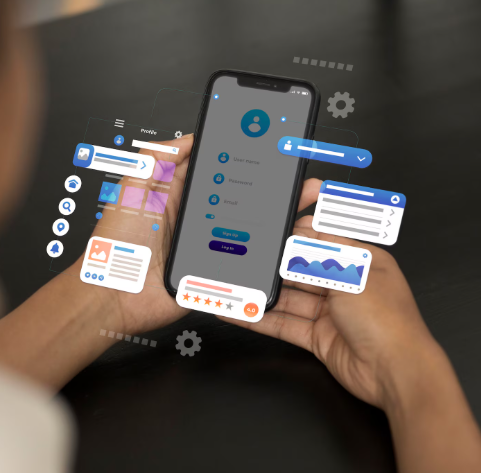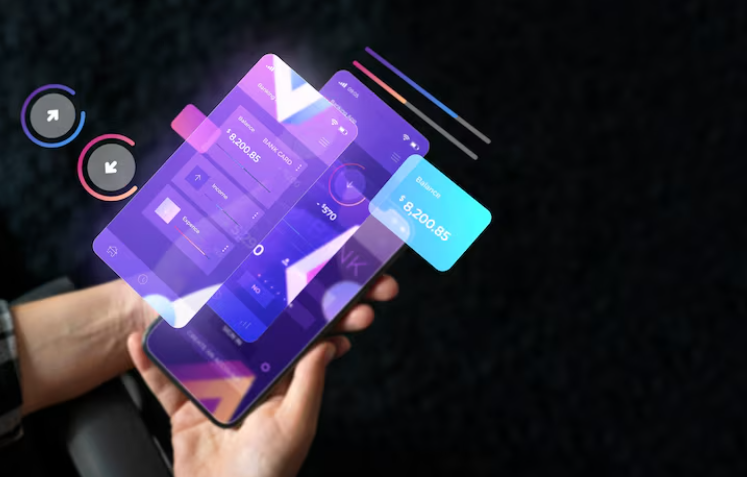Introduction
The mobile app industry has evolved rapidly over the past decade, and as we step into 2025, three technologies stand at the forefront of transformation: 5G, Augmented Reality (AR), and Artificial Intelligence (AI). These innovations are not only reshaping user experiences but also defining how businesses approach mobile app development.
In this guide, we’ll dive into how 5G, AR, and AI are driving mobile app development in 2025 and why businesses need to adapt now to stay ahead.
The Game-Changer: 5G Technology in Mobile Apps
Faster Speeds and Lower Latency
5G delivers data transfer speeds up to 100 times faster than 4G. For app developers, this means real-time processing, smoother streaming, and instant responsiveness. Gaming, telemedicine, and video conferencing apps benefit the most.
Enhanced IoT Integration
With 5G, apps can connect seamlessly to smart devices, wearables, and IoT ecosystems. Imagine healthcare apps monitoring patients in real time or logistics apps tracking shipments with pinpoint accuracy.
Improved User Experiences
Buffering, lag, and long load times will soon become outdated concepts. Mobile apps in 2025 will feel more fluid, responsive, and immersive thanks to 5G.
The Rise of AR in Mobile App Development

Beyond Gaming
While AR gained fame through games like Pokémon GO, its real power in 2025 lies in e-commerce, education, and real estate. For example:
- Retail apps offering “virtual try-on” experiences.
- Educational apps using AR for interactive learning.
- Real estate apps allowing virtual property tours.
AR-Powered Commerce
By 2025, AR is expected to fuel a multi-billion-dollar industry. Apps that let customers preview products in real environments will drastically reduce return rates and boost satisfaction.
Integration with Wearables
As AR glasses and headsets become mainstream, mobile apps will integrate with them to deliver next-level immersive experiences.
The Power of AI in Mobile Apps
Personalized Experiences
AI enables apps to learn from user behavior and deliver tailored recommendations. From ecommerce suggestions to fitness plans, personalization increases engagement and conversions.
Smarter Chatbots and Virtual Assistants
AI-driven chatbots in 2025 can understand context, emotion, and intent, offering near-human interactions. Apps will provide 24/7 customer support without compromising quality.
Predictive Analytics
AI algorithms analyze user patterns to predict future behavior. For businesses, this means anticipating customer needs and improving decision-making.
AI-Powered Automation
From automating financial transactions to managing schedules, AI makes mobile apps smarter and more efficient for both businesses and users.
How 5G, AR, and AI Work Together
The true potential of mobile app development in 2025 lies in the synergy of these technologies:
- AI + 5G: Real-time data analysis with minimal lag, ideal for finance and healthcare apps.
- AR + AI: Smarter AR apps that adapt experiences based on user behavior.
- 5G + AR: Lag-free immersive experiences in gaming, shopping, and education.
Together, they create apps that are faster, smarter, and more immersive than ever.
Industries Leading the Way
Healthcare
Mobile health apps now combine 5G-powered telemedicine, AI-based diagnostics, and AR-driven medical training simulations.
E-Commerce
Retailers use AR try-ons, AI personalization, and 5G streaming for seamless shopping experiences.
Gaming
With AR-driven graphics, AI-driven NPCs, and real-time 5G connectivity, mobile gaming in 2025 feels closer to console-quality.
Education
Mobile learning apps combine AR simulations, AI tutors, and 5G video lessons to make education more accessible worldwide.
Challenges to Overcome
- High development costs for AR and AI integration.
- Privacy concerns with AI data collection.
- Compatibility issues with 5G availability in some regions.
- User adoption for AR wearables still maturing.
Businesses that address these challenges will lead the mobile app revolution.
The Future Outlook
By 2025 and beyond, mobile app development will no longer focus on just functionality—it will prioritize immersive, intelligent, and instant experiences. Apps that leverage 5G, AR, and AI will dominate industries and set new benchmarks for customer engagement.
Conclusion
The future of mobile app development in 2025 is powered by 5G, AR, and AI. Businesses that embrace these technologies will deliver superior user experiences, streamline operations, and gain a competitive edge. The key is not just adopting these technologies but integrating them strategically to align with user expectations.
If you’re planning to build or upgrade an app in 2025, it’s no longer a question of whether to use these technologies—it’s how fast you can adopt them.

